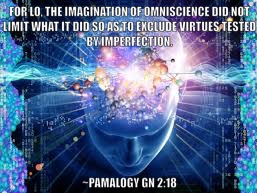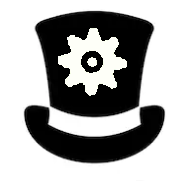GENESIS
II
the paradox of imperfection
1And in the Universe of Earth humans were formed from the dust of the ground and the depths of the sea with other bioforms but not all bioforms attained consciousness equally. For there was great variety.
2In the first epoch of the animal kingdom a general pattern existed so

that the reticular system of the brain provided rapid reflexive action and desire and it was the first to evolve.
3In the second time, the cerebral cortex evolved and helped man and other animals in various ways and enabled survival through increasingly complex social patterns seldom with any thought to right or wrong.
4In a third day there was a great flourishing and variety among animals and in that period of time humanoids and some other animals developed a frontal lobe, which among other things made them adept at thinking about the long term consequences of actions not just for preservation of self but with an interest in all, not just those within close families and tribes. 5The frontal lobe helped such species consider the purpose of life and to feel great remorse for wrongdoing, as well as shame others for doing so. 6Thus was morality and reason given to homo sapiens and some other creatures but doing what was best was not the first instinct either of male nor of female in any animal. 7For the reticular system and the cerebral cortex had evolved together for a very long time without the presence of any sizeable frontal lobe in animals.
8Thus were many creatures morally unconscious and in many Universes there were awesome things that of their nature only could be awesome in a particular way if they were born in the context of partial non awesomeness, which moral unconsciousness assisted. 9And such was the Universe of Earth but Universes that included both amorality and moral good served a worthy purpose for the sake of awesomeness.
10The virtue of patience, for instance, could only be realized if patience was exercised through trials. 11Forgiveness also could only be exercised if there had been wrongdoing. 12Faith, applied faith, similarly could be made real only if it was tested through practice. And there were many ways in which good things happened when faith was tested. 13And some humans considered this. But the site of war, of famine, of injustice and of disease made many lose faith. 14And still others held fast to their belief in Perfection despite such things. And these were among the thoughts of mankind as he evolved.
15And the many disbelieved in Perfection when they saw imperfection. They did not comprehend that in the power of a greater Perfection than they imagined, all imperfection might not have actually ever existed. 16For they walked by sight and not by faith. And their vision was dim. And they comforted themselves by shutting their eyes entirely.
17They did not know that in the Beauty of Truth would be found the means to maximize awesomeness in such a fashion that both those things which are purely good and those things which are good but required imperfection for their goodness to be manifest, would occur.
18For lo, the Imagination of Omniscience did not limit what it did so as to exclude virtues tested by imperfection. 19Rather all virtues and every good thing was included in the maximization of Awesomeness, not just some.
20And it was also good that no imperfection would ever have been. Therefore, it never was. 21And among the few who understood and believed this were the Pamalogists.
22Truth accomplished this prodigy, the Pamalogists said, by selectively entangling Universes. 23Perfection selectively disentangled imperfection from all that was awesome in the performance of all that is good in abstraction. 24InterUniversal fields of Beauty radiated the constancy of Awesomeness found in Truth poly astronomically. 25And the poly astronomical fields of Beauty and the poly astronomical fields of Consciousness were united.
26And that which was entangled in the fields of Beauty belonged to the everlasting Universes. And those things which were disentangled did not belong to the fields of Beauty which enlightened their imperfect Universes.
27And many Universes had space-time continua. And Beauty traversed their where-when dimensions. 28Thus there was awareness of light in them and that which knew consciousness through these fields knew space and time accordingly. 29But Universes that included amorality were disentangled from these all good fields so that their own space and time would never come to be or have place. 30Thus the consciousness of the good came to be but many Universes only appeared to be but were not. 31For they were disentangled from Beauty and existed only as unrealized possibility.
32Such was the non-existence of the Universe of Earth. 33Yet the consciousness that was united to Beauty through it, though it was itself non-existent, truly was and always will be. 34For the Maximization of Awesomeness is the inclusion of all good possibility and the exclusion of all non-goodness in reality.
35Thus it is that where there was imperfection there was not imperfection because imperfect Universes only existed in a disentangled non-existent way for the beauty in them. 36And the beauty existed only in fields of Beauty, while the imperfection did not exist because it had no place or time. 37For to have no place or time is what it means for whole Universes to be forever disentangled. Whatever beauty is in them has belonged to another from the beginning, from whence its light has come.
38And though it shines very brightly, even perfectly, the darkness does not receive its light. It did not receive the light. It is non-existent and therefore cannot receive the light. 39And there is no fellowship between the light and the darkness.
40And this darkness the Pamalogists called imperfection. Yet imperfection did not exist.
<< PGen Ch1<< || PGen Index|| >>PGen Ch3>>
